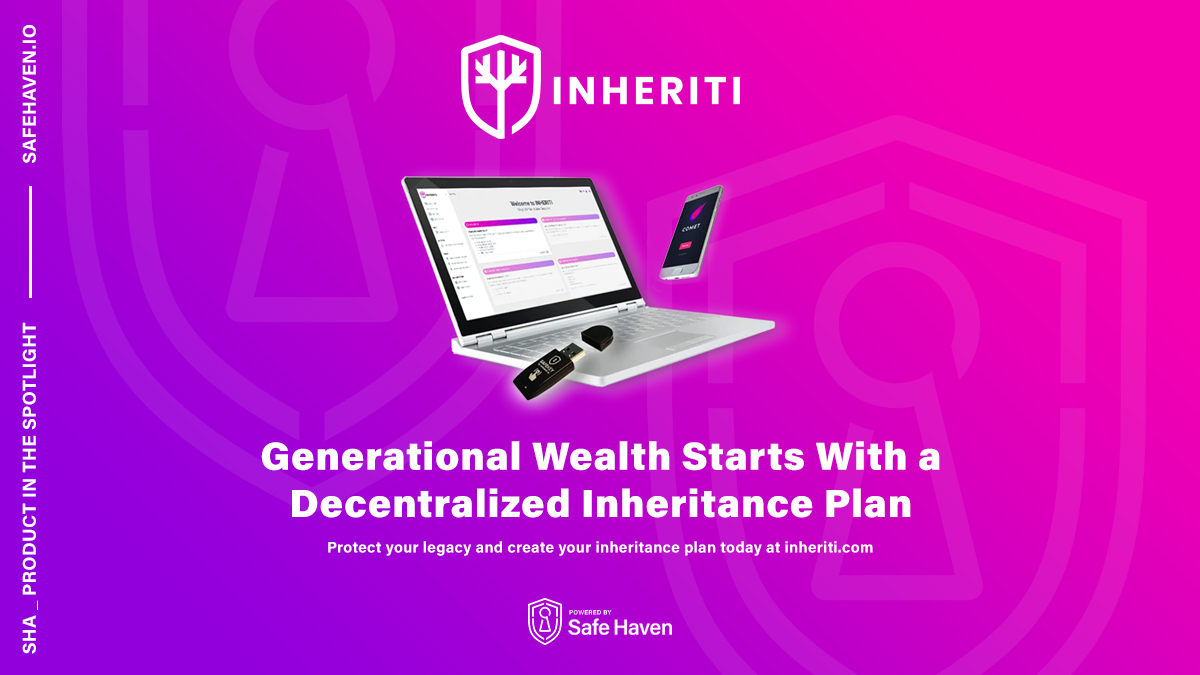There’s an inheritance problem in crypto.
In crypto’s history, many fortunes have been made, but more and more fortunes are now getting lost forever.
There are many cases where people have lost their seed phrase or private key, had their computer crash or died unexpectedly.
Even keyholders of business organizations have disappeared.
How is this possible funds can get lost that easily?
In a multi-trillion dollar industry, valuable assets still too often ought to be secured beyond writing a secret phrase on a little piece of paper.
Very few people are taking proper care of their hard earned assets.
So what’s the solution to the inheritance problem in crypto?
In order to understand we’ll need to take a closer look at what inheritance exactly is and how crypto is stored and handled.
What is inheritance?
Inheritance is a financial term which describes assets being passed down to individuals after a person dies.
These assets contain all material and financial goods and debts a person may leave when they pass away.
Nowadays, in the age of the internet, most people also have a full digital identity and legacy as well.
Think about social media accounts, crypto wallets, email addresses, pictures, videos, passwords, PIN codes, …
But how should all of this be prepared for inheritance?
What’s the difference between traditional inheritance and inheritance in crypto?
Generally speaking, there is quite a big difference between normal inheritance and inheritance in crypto.
Upon someone’s passing, traditional assets like bank accounts, real estate and material goods are usually regulated by notaries and accountants.
Digital assets in the form of cryptocurrencies and NFTs are stored on the blockchain. Most people use decentralized wallets to access their assets.
They would need to know their blockchain address, private keys, seed phrases and passwords in order to interact with the blockchain.
Others keep their assets stored on exchanges, in decentralized exchange liquidity pools and staking programs.
The private data required to access these is often quite similar.
Most crypto investors would have a wish for certain heirs to inherit this data and their assets after they pass away. But often, their heirs are simply not given the data, or it is given to them in an unsafe way.
Adding to that, the frequent lack of instructions, clarity and regulation often results in crypto assets getting lost or mishandled when the original owner passes away.
How will you keep your private key backups safe?
Many people opt to write their private key backups down on paper and hide it somewhere. This is a dangerous method, since data can be lost, stolen or damaged this way.
Others carve their private keys in a piece of stainless steel and hide it somewhere. This is dangerous too, since their data can still be lost or stolen.
Similar problems arise with writing down words in a book or spreadsheet, or taking a screenshot.
Some crypto investors would think storing their private keys in a safe or with a notary is better than the above. But that does not eliminate the risk of damage, theft or loss either.
Preparing an inheritance plan for crypto
While spending your time, money and effort investing into crypto, it’s necessary to think about who will inherit your digital assets.
Clearly it’s wise to prepare a crypto inheritance plan. But should you share your private key or your seed phrase with your heirs already?
It’s better not to.
Yes, if you do so, they will be able to access and control your crypto assets after you die.
But on the other hand, they will also have access when you’re alive. It’ll add an extra vulnerability.
Should it fall into the wrong hands, your crypto assets may be in serious danger, both when you’re alive and after you’ve passed away.
It’s obvious most people are still unsafe people when storing their private data. Even fewer people have an idea on how to pass it on to the beneficiaries.
How should you do it?
All-in-one solution for the inheritance problem in crypto, does it exist?
Yes, there is a solution to all of these problems.
Inheriti® offers an all-in-one solution that can help you securely store your crypto assets and pass them on to your loved ones in the event of your death.
With Inheriti®, you’ll have peace of mind knowing that your assets are safe and will be passed on according to your wishes.
Inheriti® stores private keys[MOU3] and other critical data with patented decentralized technology. It’ll make them accessible to heirs, but not before the user’s passing has been proven via the activation method chosen by the user.
Does crypto inheritance need a legal middleman?
For Inheriti®, you’ll only need to appoint your beneficiaries and a merge authority.
The merge authority is the first beneficiary who will oversee the other beneficiaries coming together to unlock the data. This merge authority will then be allowed to release the shares that are stored on-chain when all conditions for release are met.
It’s up to the user to decide who their beneficiaries and merge authority will be.
A notary or legal middle man is not required, but the user can decide to appoint them to be the merge authority if he wants it.
A secure and 100% decentralized solution to the inheritance problem in crypto
With Inheriti®, your assets will be securely stored during your life and after.
You can set up a plan to store your private data and appoint your beneficiaries at any time. You will always remain in full control of your assets.
The Inheriti® solution is the perfect way to ensure that your crypto assets are securely passed to your loved ones. All according to your wishes.
The inheritance problem in crypto has never been easier to solve! Set up your crypto inheritance plan today.
Click here to learn more about our patented solution: Inheriti® »
Back to wiki



